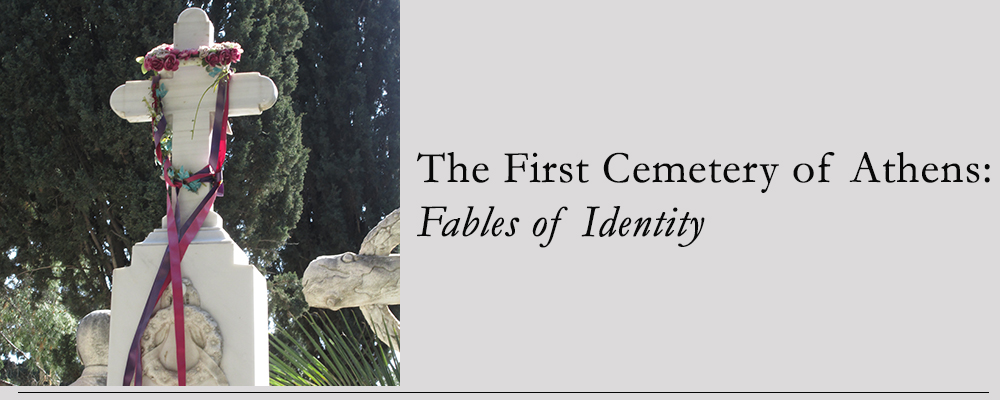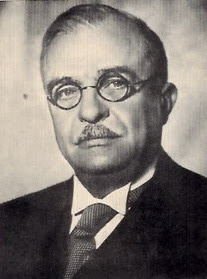John Metaxas ΙΩΑΝΝΗΣ ΜΕΤΑΞΑΣ
Born 12 April, 1871 in Ithaca Died 29 January, 1941
Section 5, Number 545
In 1936, Ioannis Metaxas - 65 years old, short, pot-bellied, and scholarly
looking, realized a vision. In the mold of Hitler, Mussolini, and Franco, he presided,
as dictator, over the short-lived Third Hellenic Civilization, a brave
new world that purported to embrace the values and ideals of the ancient
Greeks (Spartans, not Athenians), the Christian-Byzantine Empire and, we might
add, many of the ideals of Germany’s Third Reich. His 4th of
August Regime lasted from August 4th 1936 until his
death on the 29th of January, 1941 – long enough to have affected
Greek politics right up until the present day.
And yet, Metaxas is a hero to many because during his tenure he refused
to allow Mussolini entrée into Greece His famous OXI (NO) on October 29 1940 (1) galvanized the nation into beating back the
Italian onslaught (something even Hitler admired), and because he openly embraced certain ideals that are,
even today, very much a part of the Greek national psyche.
a telling
portrait
His Life
Ioannis Metaxas grew up in Cephalonia,
an island where a branch of his family had an illustrious history.(2) An
excellent student, he graduated from the Greek Military Academy in 1889, then became a field officer in the ill fated war
with Turkey in 1897 where he impressed the
then Prince Constantine who knew talent when he saw it. He went on to the
German Kriegsakademie in Berlin
where he studied military strategy for three years until 1902 and graduated at
the top of his class in every subject.
A royalist and an admirer
of the German Military order, by 1916,
he had risen in the ranks to become a Lieutenant
General in the Greek army, a position of real power and one in which he
advised the prime ministers of the era (including Eleftherios Venizelos) and
the king.
Metaxas opposed entering the First World War on the side of the Entente against
Germany. His reasoning was both strategic (his area of
expertise) and emotional. In a letter to
his wife in 1914, he had written: German
culture is the culture of the future and the hope of humanity. It was a sentiment shared by many at the time.
He went into exile when a new
government under Eleftherios Venizelos took power and declared war on Germany
on June 29th 1917 but would return after Venizelos’ 1920 election
defeat.
Things went from bad to
worse in 1922 as the Greek army went into Asia Minor, an adventure and dream the
King supported, but Metaxas, the military strategist, had realized was a
terrible mistake. The Asia Minor debacle (3) effectively
ended the monarchy for the next 13 years. Greece would become a republic until
1935. Metaxas again went into exile, but not for long.
He returned, and this time entered the political arena (an arena all too close to the military one throughout modern
Greece’s history). His small party had some success in the
politically turbulent 1920s, less so in the early 30s. Then Fate,
in the person of the newly reinstalled Greek king, intervened.
George
ll, well aware of Metaxas’ royalist sympathies, appointed him Prime Minister on April 13, 1936 although Metaxas’ Free Thinkers Party had only won 3.9% of the popular vote in the
1936 election. Kings could do that. (4)
Less than four months later, on August 4, 1936, and with the king’s blessing, Metaxas dissolved parliament
and established his dictatorship.
He abolished
all political parties, even his own, and chose to see himself from that moment
on as an independent, henceforth to be referred to as the Archigos, the Leader, someone above politics
altogether. This paternalistic image came
easily to him where the Greek people were concerned. As early as August 21, 1914, he had written
in his diary that he considered Greeks “spiritually immature”. He saw himself as a mature and rational ideologue,
one who could educate and guide the nation! Many Greeks agreed.
Metaxism
His vision for Greece was not new.
It involved a blend of ethnic nationalism (to preserve cultural purity of the nation), monarchism (shades of Byzantium) as one of the pillars of national unity, anti-parliamentarianism (not surprising
when he had only 7 members in parliament
in 1935) and anti-communism. The rise of the communist party was seen by him and his patron King
George ll as a scourge to be eradicated.(5)
His tenure was highlighted by
harsh repression of Communists (aided
by his ruthless interior secretary, Constantinos Maniadakis), and his effort to ‘educate the young by including them all in
a Nazi style youth organization called EON,
The National Youth Organization, an entity
that would have been, and probably still would be, the envy of an
absolute dictator anywhere!
The EON Badge
It involved all children from the age of 6 to7 joining the "National Youth Organization"
(EON) and dressing in dark blue uniforms, with the EON emblem on their hats.
The younger the better,
and what we today can only identify as the Nazi
salute…
Physical fitness has always seemed more of an
ideological concept than a reality for dictators…
The communist party was outlawed
and their leaders imprisoned. Even non-communists like Georgios Papandreou were
imprisoned. Constantinos Maniadakis
became notorious for torturing communists and left wingers, a repression that
would have far reaching repercussions during the German occupation during World
War Two and after. (6)
Although Metaxas wanted to
remain neutral during the build up to World War Two, Italy's ill- planned invasion
led to the famous ochi (no!) of October 29 194O, and his
successful repulsion the Italian army,
the aspect of his tenure for which he is best remembered today and one that ever
since has seemed to serve as a kind of retrospective
redemption for a man who was, in reality, a ruthless dictator. (7)
His Death
Ioannis Metaxas died
suddenly on January 29, 1941 of complications from a throat infection. There
are many conspiracy theories about
his death, the most popular being that the British assassinated him (through
their army doctors) because he was unwilling to go against the Germans who were,
at the time, massing troops on the Bulgarian border. Others pooh pooh this
idea, pointing out that he had in fact been ill for some time, although that
was not for public consumption, and that
there had even been time for the famous icon of Mary to have been brought from Tinos,
- to no avail.
His death stunned the nation. EON troops of all ages were
mustered to line the streets all the way from Kifissia where he died until the
Metropolitan Church where he lay in state and his funeral was held.(8)
His successor was Alexandros Koryzis, a banker. The king
installed him as prime minister just
hours after Metaxas’ death. Greece had no parliamentary government, Koryzis was
not at all a leader in the mold of Metaxas, and the Germans were on Greece’s
doorstep.
Hitler invaded a unprepared Greece in April, just a few weeks after
Metaxas’ death.
His Grave
Section 5, Number 545
It has a very small guardian angel, but a very
large cross…
His grave is large but
simple,-austere even. It is a family grave although his name along with that of
his wife, Lela, are the most prominent.
It is just a few rows away from another famous dictator, Georgos
Papadopoulos.
His grave has been desecrated in the past by vandals. See https://en-contrainfo.espiv.net/2011/11/02/athens-first-cemetery-metaxas-tomb-desecrated/ . The
motive, while comprehensible, seems futile, but that is still a matter of
opinion for some. Ioannis Metaxas has always had vehement detractors and avid admirers. Many of them are now buried
in the democracy of death in Athens’ First Cemetery.
The Map
Footnotes
(1) His
actual words were: Alors, c' est la guerre!
(3) The defeat of the Greek Army in Asia Minor and the destruction of Smyrna
in 1922 effectively ended “the Great Idea” of Greek territorial expansion.
(4) Between 1924
and 1935 there were 23 changes of government in Greece, a dictatorship and 13
coups. A short lived Greek experiment with republicanism had ended with the
return of King George ll in a rigged plebiscite that could not have made the
King feel at all secure. The king, to his credit, wanted to declare an amnesty between republicans and monarchists
but could not agree with the then prime minister, so new elections were held in January 1936 that
were not to the king’s liking either – the communists appeared to hold the
balance of power. Enter Metaxas whom George then appointed Prime minister and shortly
afterward, allowed him to dissolve parliament. Kings in Greece have had a rather sorry
history but, then again, so have parliamentarians.
(5) It is impossible in a thumbnail history to convey the impact of Metaxism
on the era. One interesting source is Popular
Autocracy in Greece 1936-41: a Political Biography of General Ioannis Metaxas
by P.J. Vatakiotis. There are many others.
(6) Constantinos Maniadakis
landed on his feet after the war – as did many members of Metaxas’ security
forces. He is also buried in the First Cemetery.
(7) Like
most dictators, Metaxas was convinced his ability to ‘cure’ the country. He did
create a national insurance scheme (IKA) and built the Kiffisia- Athens railway,
but at what cost? Oxi Day (October 28th) is
still a Greek National Holiday.









Δεν υπάρχουν σχόλια:
Δημοσίευση σχολίου